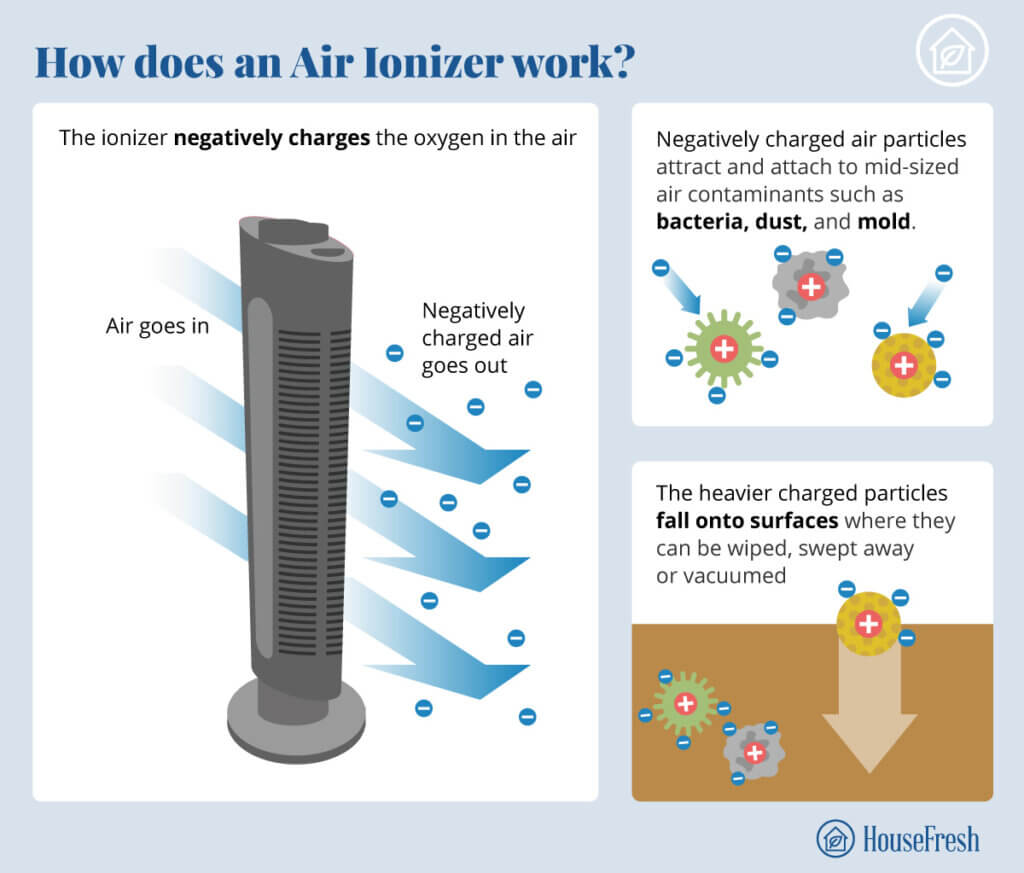In simple terms, ionizers emit negative ions into the air, which can bond with positively charged ions (including certain types of particles) to create heavier charged particle that will drop to surfaces in your home or within the ionizer device itself, allowing you (or the device) to clean them up.
Here is a handy graphic for those of you who are visual learners:

Now you know how it works, let’s go through it in more depth:
There are invisible molecules made of ions in the air around us. Ions contain electrical charges, which are either positive (cation) or negative (anion) charges. When anions gain an electron, they become negative charges, but when cations lose an electron, they become positive charges.
So, the idea behind air ionizers is that they produce and release negative ions into the atmosphere, which are then attracted to and able to attach to positive particles in the air around you. This includes things like tobacco smoke or odors.
When negative and positive ions are attracted to one another, this creates an electrical charge, and the particles become stuck.
The stuck particles are then too weighty to remain in the atmosphere, so they fall onto positively charged surfaces around your home and stay there. This includes ceilings, walls, floors, tabletops, curtains, carpets and rugs. The particles can then be cleaned from these surfaces, removing them from your environment.
Some models of ionizer devices have metal plates built into them that collect these particles. These can then be wiped away from the plates.
As you can see, this is quite different from what mechanical filtration air purifiers do.
While ionizers can be effective at removing certain things from your environment, they are nowhere near as effective as air purifiers and, in addition, can introduce many unwanted toxins into your home.
- A 2021 study co-authored by Illinois Tech, Portland State University and Colorado State University researchers found that while ionizers could decrease certain VOCs from your environment, they led to an increase in others.
- Researchers from The University of Texas found that the potential benefits of ionizers were overshadowed by the harmful pollutants and ultrafine particles created when running the device. These included ozone and formaldehyde, which increased significantly in the atmosphere.
- A study from 2021 found that while ionizers could be helpful in effectively removing particulate matter from your environment, they could also potentially harm the health of some, especially asthma sufferers.
- On the flip side, a 2017 study conducted by Australian researchers found that ionizers could be quite effective at removing particulate matter from large rooms with a footprint of 25 m3 or more. This was especially true compared to the particulate matter removal results of a high-flow HEPA filter air purifier in the same space. It’s important to note that the air purifier was much more successful in smaller rooms. In addition, the effectiveness of the air purifier and ionizer decreased as the room size grew.
Understanding the disadvantages of using an ionizer
As we’ve already discussed, while ionizers can effectively remove certain particulate matter from your environment, there are many more disadvantages.
- Ionizers are not effective for removing larger particulate matter. This includes dust, pollen and pet dander. All these are known to be triggers for those with allergies or asthma.
- Ionizers can cause asthmatics to suffer from increased symptoms, making them especially dangerous for people with asthma.
- Ionizers cannot remove gasses and odors (including VOCs) and can even increase the presence of certain VOCs when running. VOCs can be extremely harmful to your health. In addition to various symptoms, including eye irritation, nose and throat, they have even been known to cause cancer.
- Due to how ionizer devices work, they emit ozone as a side effect. While ozone has been shown to potentially help remove viruses from your environment (particularly from water), it has many detrimental qualities that could negatively affect your health.
Some of the more short-term effects may include:
- Irritation of the throat
- Pain in the chest
- Coughing
- Shortness of breath
In the long term, inhalation of ozone could lead to:
- Decreased lung function and inflammation of lung tissue
- Increased asthma symptoms and a higher probability of respiratory infections
The potential risks far outweigh whatever good could come from running ionizers in your home — especially if you have members of your household who are higher-risk individuals.
HouseFresh doesn’t recommend ionizers

Final thoughts
Ionizers are an alternative device to air purifiers that work by emitting negative ions into your environment. This allows them to become attracted to certain positive ions, including various pollutants, causing them to fall from the air onto surfaces around your home.
While they can be effective (especially in water filtration systems and larger rooms exceeding 25 m3), there are many more negative health considerations with ionizer devices.
This is because they are ineffective at removing larger particles and also emit VOCs and ozone as a side effect. If you’re considering an ionizer in your home, conduct thorough research beforehand and carefully weigh the pros and cons.
While it’s tempting to buy into the rhetoric that ionizer device distributors are pushing, the science tells us that this is still a relatively low-researched field regarding the potential positive outcomes.
SOURCES
- Buddhi, P. (2017). Efficiency Of Ionizers In Removing Airborne Particles In Indoor Environments. sciencedirect.com
- Cheng, Q. (2021). Air Ionizers Case Study. iopscience.org
- Jiang, S et al. (2018). Negative Air Ions and Their Effects on Human Health and Air Quality Improvement. ncbi.nlm.nih.gov
- Rosenthal, J. (2008). Researchers Confirm Some Air Cleaners Generate Ultrafine Particles. texairfilters.com
- United States Environmental Protection Agency. Volatile Organic Compounds’ Impact on Indoor Air Quality. epa.gov
- United States Environmental Protection Agency. Ozone Generators that are Sold as Air Cleaners. epa.gov
- Vanzo, T. (2023). Study Finds Ionizers Increase Air Pollution. smartairfilters.com
- Waring, M.S. (2008). Ultrafine Particle Removal And Generation By Portable Air Cleaners. sciencedirect.com
- Zeng, Y et al.. (2021). Evaluating A Commercially Available In-Duct Bipolar Ionization Device For Pollutant Removal And Potential Byproduct Formation. sciencedirect.com
- Zeng, Y et al. (2021). Study Uncovers Safety Concerns With Ionic Air Purifiers. phys.org
- Zeng, Y et al. (2021). Study Uncovers Safety Concerns With Some Air Purifiers Marketed For Covid-19. natsci.source.colostate.edu





